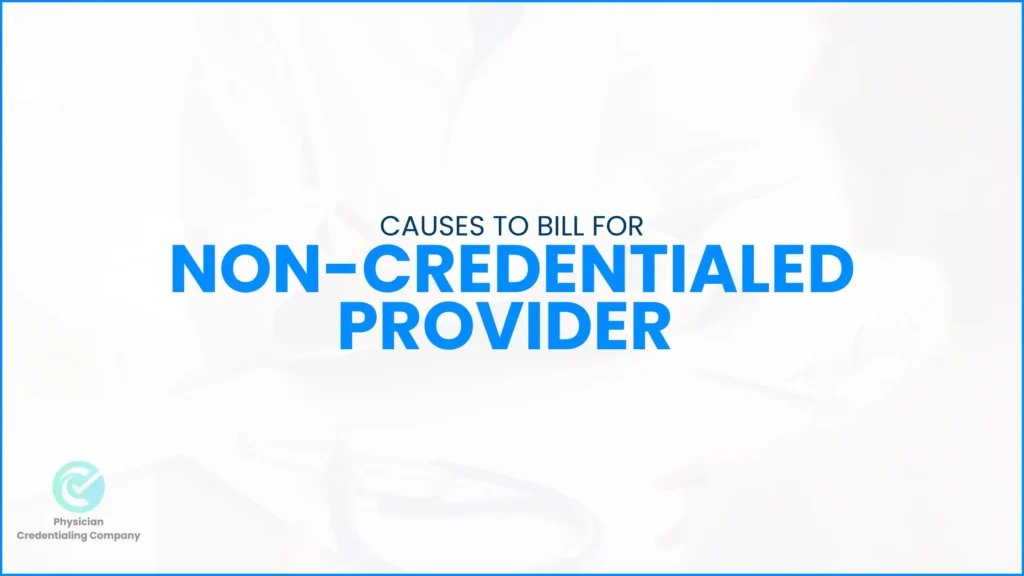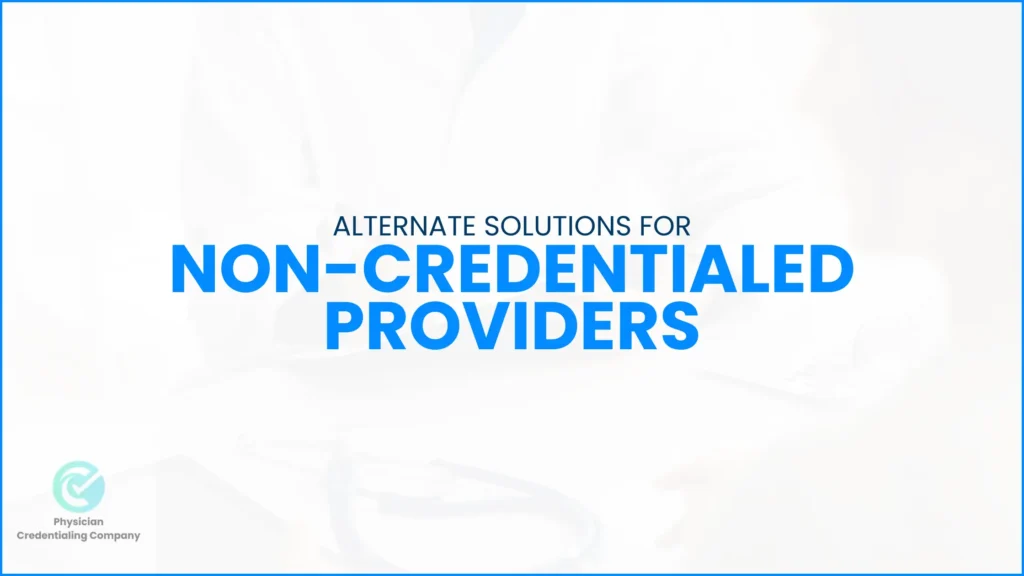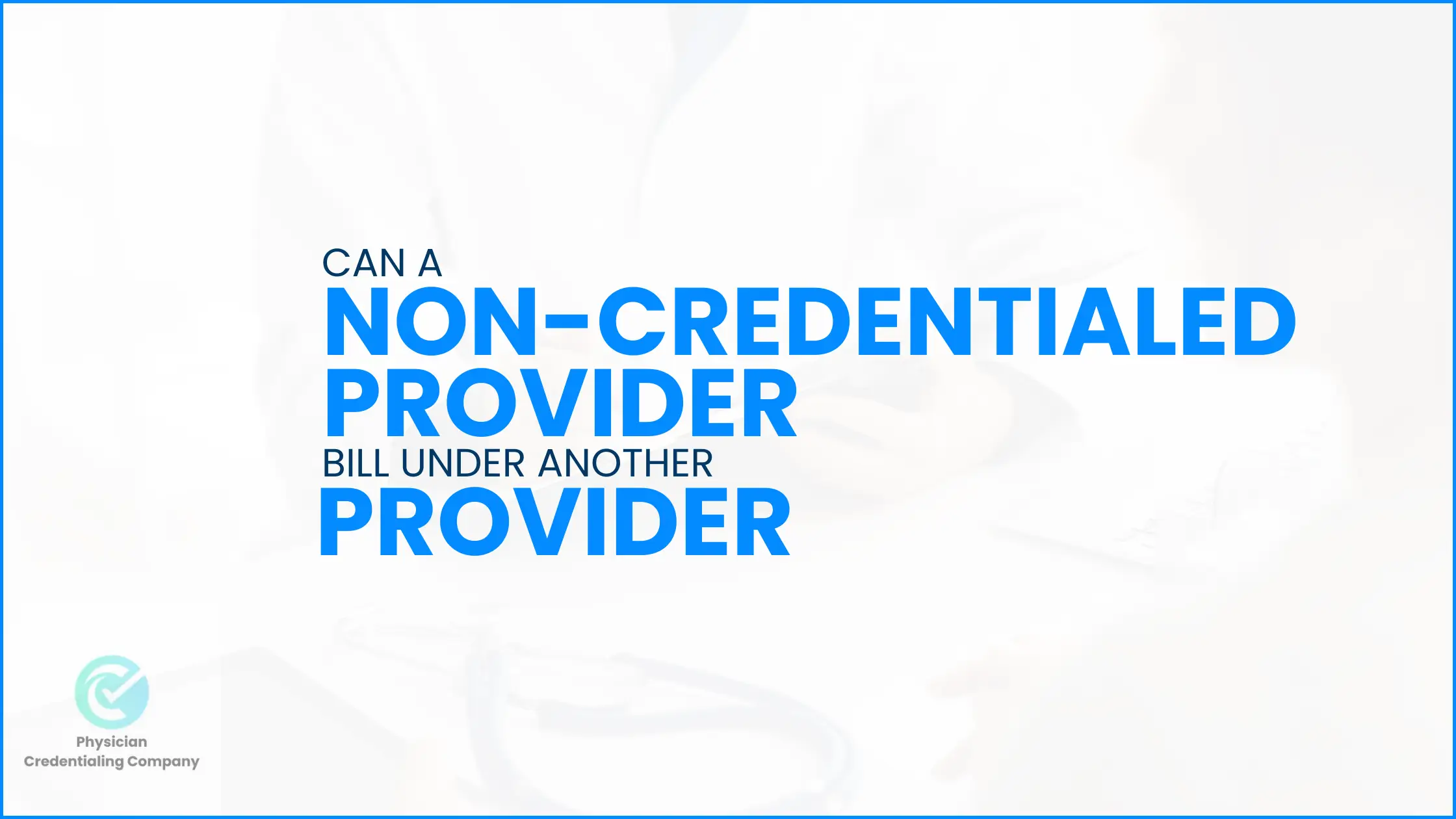The healthcare industry ensures that only well-qualified and skilful healthcare providers should render patient care services. For this reason, credentialing is necessary before hiring any professional. Health insurance companies also allow credentialed providers to submit claims for healthcare services. After credentialing, each healthcare provider, whether in group service or individual facility, is reimbursed to his National Provider Identifier (NPI) number.
However, the question arises whether there is any condition in which a non-credentialed provider can be billed independently or under a supervising provider in medical billing. There are factors we should keep in mind before saying yes or no to this answer. There are a lot of federal and payer-specific policies about billing non-credentialing providers.
Causes to Bill For Non-Credentialed Provider
It is better to understand the causes when billing for non-credentialed providers is needed. There are a few conditions discussed below:

1. Permanent New Recruit
Medical credentialing is a complex and time-consuming process, and every new recruit must go through this process to confirm his legitimacy for practicing. It acts as a shield against malpractice claims under the False Claim Act. It takes 2-3 months for credentialing, and new recruits can’t just sit and wait during this time. In order to stay aligned with medical practice, they need to see patients and work. This is the necessity for permanent new hires to be allowed to work and submit claims to payers.
2. Temporary or Substitute Hire
We are all very aware of the locum physicians who are hired by the healthcare facility in case of any vacancy. Conditions arise when doctors are on leave for sickness, holiday or pregnancy, and facilities need to fill the gap with new physicians to continue the provision of medical services to patients. It is an administrative burden if a hospital goes to credentialing these locum physicians. There should be some policy to submit bills for services rendered by locum physicians.
What does billing under another provider mean?
Billing under another physician refers to the use of his NPI number for reimbursement in return for services provided by a non-credentialed provider. Can you bill under a supervising physician? There are many scenarios in which it is allowed as per the instructions of the insurance companies. It can be billed under a supervising physician or absent physician in case of locum jobs.
In the case of permanent new recruits, billing under another provider is called “incident-to-billing”. New providers can render medical services under the direct supervision of credentialed providers. Claims are submitted against the NPI number of the supervising provider in medical billing. Documentation should also be maintained on how providers supervised non-credentialed providers and the type of rendered services.
When non-credentialed providers are absent and their gap is filled with locum providers, then what is the condition in this case? For temporary recruits, the NPI number of absent credentialed providers is used for billing and locum providers are supervised by other credentialed providers working in the hospital facility. Below are some points to consider:
- Only 60 days are allowed for locum physicians to render medical services in healthcare facilities.
- NPI number of absent providers will be used whose place is taken temporarily by the locum provider.
- Use the Q6 modifier with each CPT code while submitting claims for medical services. This ensures that health payers should also know that these claims are submitted by locum physicians.
- Medicare guidelines should be checked if you are billing this payer. Sixty days is a consecutive limit, including the days off.
Risks of Billing Under Another Provider
Billing for non-credentialed providers is very complex. Individual and group practices should take necessary measures and get enough knowledge before billing for them. The following are some risks involved:
Compliance risks
Compliance with policies and regulations is considered a cornerstone in medical billing. In case of suspicion of non-compliance, claims can be rejected, and even healthcare facilities may have serious implications. It is wise to understand the federal and payer-specific rules for billing non-credentialed providers. Each payer has its own policies and rules for billing. Medicare and Medicaid allow non-credentialed providers to get reimbursement but under strict rules. At the same time, most of the commercial payers do not support such billing. Submitting claims without contracting payers for non-credentialed providers’ services, as well as fraudulent claims according to the False Claim Act, can be implemented.
Legal and financial risks
For not following government and payer-specific guidelines, providers may have to bear legal penalties in terms of finances or exclusion from the program. It was reported in 2018 that a healthcare facility in New York paid about $6.6 million as a penalty because a non-credentialed provider billed under another physician’s NPI number against payer policies. Similarly, in Oklahoma, physicians had to pay $580,000 as a penalty amount. These are true examples that show the importance of regulatory compliance.
If you want to grow financially and protect your facility from legal implications, then always stay updated with policies and follow them.
Risk to reputation
Organizational and personal physician’s repute depends on the quality of patient care, financial transparency and compliance. Billing for non-credentialed providers can lead to serious problems that damage the company’s reputation. The whole career of a non-credentialed provider can be tarnished by one mistake. Patients also do not trust organizations involved in legal proceedings and lawsuits. It damages the patient’s trust and the overall fame of the facility. Therefore, it is advised only to bill for a non-credentialed provider when necessary, following all guidelines.
Alternate solutions for non-credentialed providers
While waiting for credentialing results, it is better for healthcare providers to look for opportunities to practice medicine. There are some options that they can adopt to work and receive reimbursement, but these remain under the rules.

Provisional Credentialing
There are some health payers that allow non-credentialed providers to submit claims. There are some preliminary requirements which must be presented to health payers. After scrutiny, they give approval to start billing. Eligibility criteria like a copy of the submission of the credentialing application and necessary medical degrees are required by insurance companies. Provisional credentialing is the best solution to becoming financially independent and remaining in the loop of medical practice during the credentialing process. Healthcare providers need to sign contracts with payers and start enjoying privileges.
Out-Of-Pocket Billing
Out-of-pocket billing is a good option but is difficult to implement and maintain. In this billing, you directly bill the patients for medical services. Providers need to ensure transparency and good communication with the patients. Providers should clear all queries and let them know that they will be billed directly due to credentialing delays. Compliance, like avoiding misinformation and double-billing, is necessary to avoid penalties and lawsuits.
Setting a discount on patient care services helps to attract patients to seek medical assistance without any financial burden. Trust will be enhanced, and providers will earn a handsome amount.
Group Billing
Group billing refers to billing payers under a group NPI number. This is applicable to organizations and hospitals which operate as a group and receive reimbursement collectively. Group services need to comply with payer policies to remain eligible for claim submission. Non-credentialed providers can become part of these group services and practices. They will receive their decided payment by the group service. This is an easy and reliable way of billing for non-credentialed providers.
Locum Tenens
Can you bill under a supervising physician? Yes, it is possible to bill under another provider, as we discussed earlier. Becoming a locum provider is a good alternative for non-credentialed providers to start rendering patient care and get reimbursement under an absent provider. Hospital facilities assign any of their credentialed providers to supervise you and let you submit claims.
Conclusion
Can a non-credentialed provider bill under another provider? The simple answer is yes, but under certain conditions and rules. As we know, credentialing takes about 90 days to process, and in this duration, providers want to practice and earn. In the case of permanent recruits, they can bill for medical services under the supervising credentialed provider in medical billing. If the provider is on locums, which is a temporary basis to fill the vacancy of the absent doctor, then the facility allows him to practice and bill under the NPI number of absent physicians. Before billing, it is recommended to thoroughly understand the policies and rules of government and insurance companies. In case of non-compliance, claims can be rejected, and all concerned parties have to face serious implications. Go through insurance guidelines, document everything, and perform audits as necessary.
FAQ - People Also Asks
Documentation is a key requirement in every billing task. In group billing, details of the non-credentialed provider, information about patient and patient care services, supervision details and relevant payer agreement details should be noted. This information is used for audits and claims acceptance.
Yes, they both can be different. As discussed above, non-credentialed providers are considered rendering providers, and the billing providers are those under whom NPI number claims are submitted.
Reciprocal billing arrangement is a common practice among healthcare providers. In it, different providers agree to cover each other’s practice in the absence of any regular provider. Sixty days is the maximum limit for covering each other’s practice and submitting claims to insurance companies.

